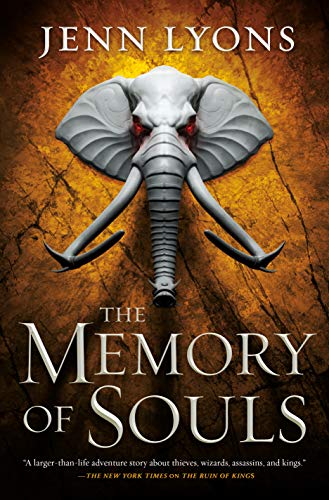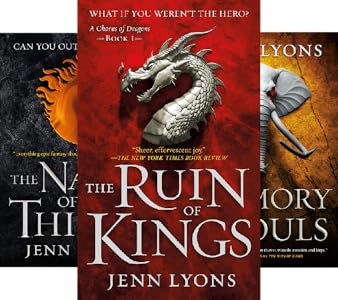
![]() The Memory of Souls by Jenn Lyons
The Memory of Souls by Jenn Lyons
I’ve had a mixed reaction to Jenn Lyons’ series since book one, The Ruin of Kings, so it seems only appropriate that I had two different reactions to book three, The Memory of Souls (2020), with a lot of frustration and annoyance to the first half of the book and a greater appreciation and enjoyment in the second half. All of which leaves me still up in the air in terms of recommending what will turn out to be a relatively lengthy series. Inevitable spoilers for books one and two to follow.
I’m not going to go much into plot details as to call it labyrinthine or Byzantine would be an understatement (maybe a labyrinth built in Byzantine and run by the DMV). There’s an imprisoned Dark Lord of Destruction (or is there?), an evil, megalomaniacal (or is he?) wizard trying to free him, a stalwart group of chosen ones (or are they?) seeking to prevent his release and the destruction of the world (or would it be?), a group of gods (or are they) trying to help as well (or are they?). There are dragons, powerful ancient magical artifacts, immortal races, shapeshifters, prophecies, blights, transport portals, secret forests, assassination attempts and actual assassinations, political intrigue, family intrigue, romantic intrigue (let’s just say lots of intrigue), footnotes, huge battles and small spats. I’m not sure there’s a kitchen sink, but it’s possible it appeared via illusion, shape-shifting form, or with a different name because it was reincarnated or resurrected (or both).
Oh yeah, nearly everyone: the Dark Lord Vol Karoth, the evil wizard Relos Var, the Chosen Ones Khirin, Janel, and Tereath, the dragons, and, well, almost everybody else, all have multiple names because they’ve been around for hundreds or thousands of years and been brought back to live new lives unburdened by their old ones (save for the ones who are currently remembering their past lives). Which also means lots of them are related, were married, slept together, or some combination of all that.
As you can see, Lyons is incredibly ambitious. And I applaud that ambition. Really, I do. But my dual problems (the main ones) throughout the A CHORUS OF DRAGONS series, which continue here, are that the execution doesn’t always match the ambition, and the “everything plus the kitchen sink” approach sometimes gets in the way of plot and character having an impact rather than enhancing their effects.
For example, I quite like what Lyons is doing with employing so many of the same old same old tropes of the genre: the imprisoned evil, the “blight,” the group guarding the blight, the chosen ones, etc., but calling them all into question so our expectations work against us. I like it, but in a more streamlined story I’m pretty sure I would love it. But in The Memory of Souls it’s just buried under so much other stuff. The same holds true with the characters — we’re given so many, and we get to hear from them or see them so briefly before being whisked away to another character and another scene, and they’re so swamped under so many complications — their current romantic problems, their past romantic problems, the way their past romantic problems affect their current romantic problems, and more, that the characters I could care about become just a series of names. Lots of names. And on top of that lots of names for the same person. To be bluntly honest, I didn’t care at all about any of the romance, which felt both forced and unnecessary and thus just bogged the story down whenever the text focused on it, and I stopped caring pretty early on about trying to keep in my head who was whom in a past life and how they were related (literally or not) to others in their past lives. It was enough to know so and so was angry or jealous or in love with so and so, and I didn’t care to figure out why. Once again, all that back knowledge, as executed, felt unnecessary (even though I know it kinda was — which gets to the execution again).
Similarly, I found my reading not enhanced but worsened by the footnotes, such that I was literally cursing each time I had to click on one (on the Kindle), until I just stopped doing so and read them at the end of chapters, and then started only reading some of them. Because so few offered anything of real worth to me as a reader: they didn’t affect my view of the footnote as a character and they really affected my reading of a scene. I mentioned in my review of the first book that all this complexity and POV switching and differing timelines and footnotes felt like a way to compensate for a plot employing so many of the hoary genre tropes. But if any book didn’t need that, it was this one, because this is where Lyons really starts to deconstruct all those tropes in truly interesting fashion.
All of which sounds pretty negative, and again, to be honest, I almost quit reading several times in the first half of the novel, for the reasons above and a few other issues (some plot contrivances, etc.). But there had been enough good in the prior two books, and I did, as noted, appreciate Lyon’s intent and ambition, so I persevered, albeit with some adaptation (such as not clicking on each footnote, no more trying to figure out past lives). And the latter third or so of the novel felt livelier, more compelling, more focused. Whether that was due to my changed reading style or a change in writing I can’t say; probably a bit of both, I’d guess. But the humor started to pop more naturally, there were a few effectively emotional scenes (though some had more potential than full impact), the revelations the deep past were often fascinating, and the reversals of expectations were stimulating.
I was glad, by the end, that I’d kept going, but wish it hadn’t been such a struggle to get to that point. Which is sort of how I feel about the series as a whole. After three books, I feel there’s a great duology in here, which makes me a bit nervous about two more books left. But maybe they’ll pick up where the latter part of The Memory of Souls did. As I said at the end of the prior book’s review though, for now, I’m withholding a recommendation on the series to see where it goes.
A Chorus of Dragons 1: The Ruin of Kings 2: The Name of All Things 3: The Memory of Souls




I really like the series, but for one issue. Why is almost every character bisexual? I feel like I’m being hit over the head with her grand ‘wokeness’. I’m not big on romantic literature in the first place, and I support the rights of all humans to pursue love and happiness however they care to go about it, but I don’t care to read about it every other page. To me, it feels like an agenda was being pushed, and it was extremely distracting. I read fantasy to escape – not to be hit over the head with SJW current issues.